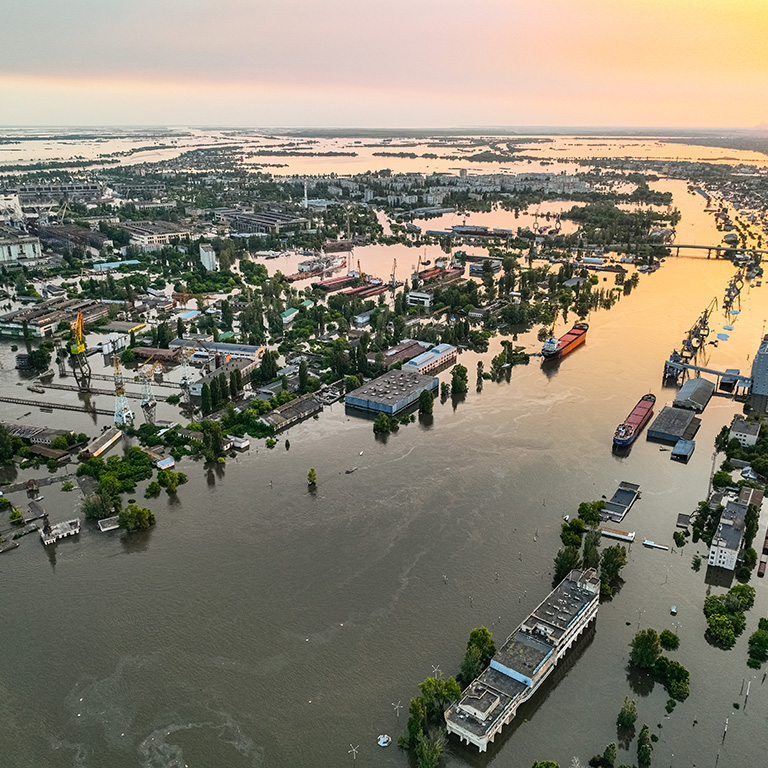
By Amy Barnes ,
Global Head of Energy & Power, Marsh
17/01/2023 · 3 minute read
During 2022, inflation hit levels not seen in advanced economies for four decades. Policymakers have faced a difficult balancing act: While increasing interest rates is necessary to respond to rising prices, it also risks tipping stagnant economies into recession, especially given high debt levels after an era of loose monetary policy. As Davos gets underway in earnest, it’s unsurprising that “Addressing the Current High Inflation, Low Growth, High Debt Economy” is one of six key themes on the program.
Some of the key causes of the recent surge in inflation trace back to Russia’s invasion of Ukraine in February 2022, which led to spiking prices of oil and gas. The shock to the energy market fed into the price of goods through production and transportation costs, and food through fertilizer costs disrupted grain exports from Ukraine, a major global supplier.
The global economy was already highly vulnerable to shocks due to the effects of the pandemic on, supply chains and labour markets. Competition for talent led to wage increases, which fuelled fears of a wage-price spiral, forcing policymakers to tighten monetary policy.
Many businesses have been struggling to navigate the impacts of the resulting volatility in supply chains and increasing costs of labour and other inputs. From our vantage point in the insurance sector, we have seen businesses facing an increased risk of operational disruption.
In an era of inflation, businesses also need to review the value at which their operations and assets are insured. Underinsurance – where the actual value of assets and exposures rises above the insured values – can have significant consequences. The implications for property damage can be especially serious, given how sharply prices have risen in the construction sector.
After events in 2022, it is no surprise that the Global Risks Report 2023 ranked the cost-of-living crisis as the top short-term risk. High fuel prices caused protests around the world, while rising food prices have had an especially severe impact in lower-income countries, where food accounts for a larger part of household budgets. Even in advanced countries, the cost of living is causing pain. The UK saw inflation reach 11% – the highest since 1981.
There are indications that the current situation may be sowing the seeds of further volatility. Public debt crises in developing markets have historically coincided with increasing US interest rates. The IMF estimates that around 60 % of developing countries are either already in or at high risk of debt distress. Of these, Sri Lanka became the first country in 2022 to be unable to service its debt.
Protectionist measures could also increasingly disrupt global trade. As inflation soared over 70% in Argentina in 2022, the country introduced import bans on everything from whiskey to consulting services. The EU’s concern about the trade implications of the US Inflation Reduction Act -, which among other things will subsidize electric vehicle manufacture -, shows the potential for government action in response to the economic crisis to cause tensions even among allies. It will be interesting to see if the spirit of international cooperation, which Davos aims to foster, is able to overcome these challenges.
If countries continue to respond to the crisis by aiming to increase their national self-sufficiency, ongoing disruption to supply chains could keep prices high and hold back recovery. Last week, the World Bank cut its forecast of global economic growth for 2023 from 3% to 1.7%, noting that “the global economy is perilously close to falling into recession”.
In the face of this uncertain outlook, businesses need to develop a resilience mindset. By identifying relevant questions, such as how inflation is affecting employees and business partners, companies can inform their decisions and develop strategies that will better position them for turbulent times ahead.
Page Compliance ID

Report,Featured insight
19/09/2025

Article,Featured insight
15/09/2025